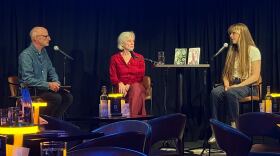The novelist Willa Cather was born in Nebraska, but composed much of her most celebrated work, including My Ántonia, in New Hampshire.
She is buried in Jaffrey, New Hampshire and that's where this weekend fans of her work will gather to celebrate the 100th anniversary of the publication of My Ántonia.
The two-day conference features lectures, tours of Cather-related sites, as well as a performance by pianist Virginia Eskin, who will also speak about the way Cather used music in her fiction.
NHPR’s Peter Biello visited Eskin at her home in Keene to talk about music in Cather's prose.
[Editor’s Note: We highly recommend listening to this story. This transcript has been lightly edited for clarity.]
We’re sitting here at your black Steinway, but first I want to ask you about your thoughts on the way Willa Cather used music in her prose. How would you describe the way she used it?
For me it's a unique way she has of always referencing the perfect music piece. It perfumes her pages and music seems to be like a solace or almost like a balm. She puts music when the novel or the little short story grinds to an emotional halt, she moves to music. She never throws in any reference without it being just spot on.
Can I ask you about an example? Maybe you could play some of the music that goes along with it. Tell me about a story or one of the novels that she's written and a piece of music that she used.
If you take the Alexander’s Bridge novel, that's about a famous bridge engineer Bartley Alexander. His wife Winifred is a very fine pianist. Bartley invites a colleague, also a bridge man, to come for dinner and they have dinner and then afterwards he sort of commands to his wife, “Play. Play something for us you know.”
And so Catherine has her go over to the piano and sit down and start. She launches into Schumann’s Carnaval. It's not the sort of thing that just some housewife plops down and starts launching into. It's a very complicated, hard, virtuoso piece. But there's also a double entendre because Schumann kills himself jumping off bridges.
Tell us about how she may have used music in her famous novel My Ántonia.
She references a black blind pianist. In the novel his name is d'Arnault, and that would have happened, there would have been ragtime bands. So since Cather likes all kinds of music, there's also references to Blue Danube waltzes and tangos. So she is able to differentiate different styles of music. It's not just opera or arias or Wagner. But I've picked out this touching Joplin rag to use because the black blind pianist in My Ántonia would have played music like this.
How did Willa Cather know so much about music?
She lived with young women musicians in a rooming house, pianist, singers, and like a lot of writers, they’re a little parasitic. They listen and they take notes. So she absorbed like a sponge all their gossip, all their references and the way they would talk over meals in the rooming house. You know, “I think he noticed my hands and I'm going to audition for him tomorrow and he likes me, I think I'm going to be hired,” You know, all sorts of babble that young women had. She was very turned on by that and then she seems to channel it into story after story after story.
This music is such a fun angle from which to approach the work and life of Willa Cather. Can you tell me about the importance of New Hampshire to Cather in her work?
I think she met the Shattuck family and they were very generous. They invited Willa and put her up in their big country home and she went to Jaffrey almost every summer. She did go to Canada, she didn't always go to Jaffrey, but she liked it there. And it's not for nothing, she chose to be buried there. She could have been buried, probably Nebraska is sad that she didn't go back because where you're born, that's your native soil. She's very much a Nebraska person. But she chose to be buried in Jaffrey, and of course Jaffrey is very proud of that.
Virginia Eskin is speaking this weekend at the “Willa Cather’s Spirit Lives On" celebration in Jaffrey.








